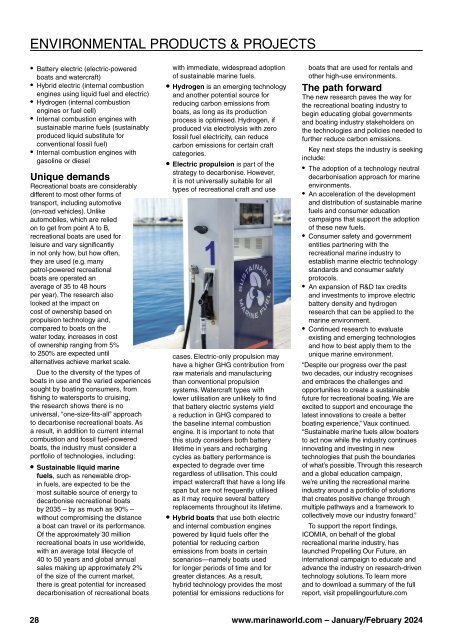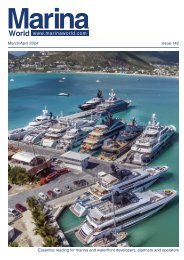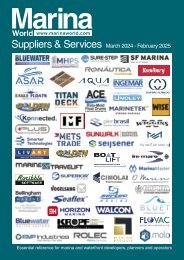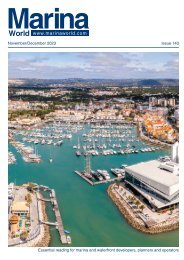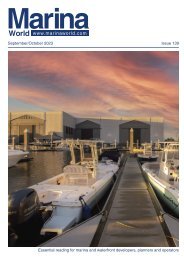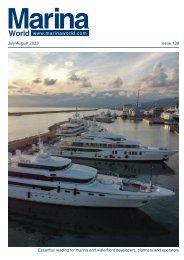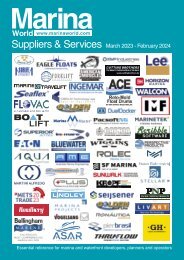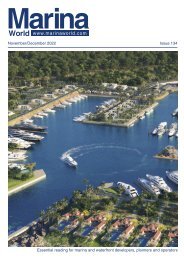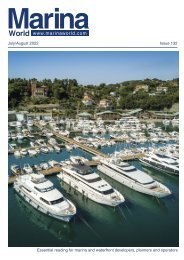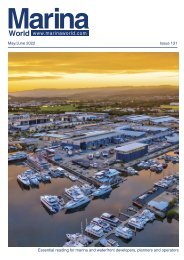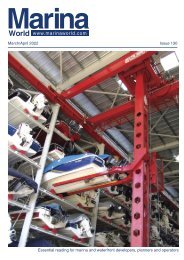2024 January/February Marina World
The magazine for the marina industry
The magazine for the marina industry
Create successful ePaper yourself
Turn your PDF publications into a flip-book with our unique Google optimized e-Paper software.
ENVIRONMENTAL PRODUCTS & PROJECTS<br />
• Battery electric (electric-powered<br />
boats and watercraft)<br />
• Hybrid electric (internal combustion<br />
engines using liquid fuel and electric)<br />
• Hydrogen (internal combustion<br />
engines or fuel cell)<br />
• Internal combustion engines with<br />
sustainable marine fuels (sustainably<br />
produced liquid substitute for<br />
conventional fossil fuel)<br />
• Internal combustion engines with<br />
gasoline or diesel<br />
Unique demands<br />
Recreational boats are considerably<br />
different to most other forms of<br />
transport, including automotive<br />
(on-road vehicles). Unlike<br />
automobiles, which are relied<br />
on to get from point A to B,<br />
recreational boats are used for<br />
leisure and vary significantly<br />
in not only how, but how often,<br />
they are used (e.g. many<br />
petrol-powered recreational<br />
boats are operated an<br />
average of 35 to 48 hours<br />
per year). The research also<br />
looked at the impact on<br />
cost of ownership based on<br />
propulsion technology and,<br />
compared to boats on the<br />
water today, increases in cost<br />
of ownership ranging from 5%<br />
to 250% are expected until<br />
alternatives achieve market scale.<br />
Due to the diversity of the types of<br />
boats in use and the varied experiences<br />
sought by boating consumers, from<br />
fishing to watersports to cruising,<br />
the research shows there is no<br />
universal, “one-size-fits-all” approach<br />
to decarbonise recreational boats. As<br />
a result, in addition to current internal<br />
combustion and fossil fuel-powered<br />
boats, the industry must consider a<br />
portfolio of technologies, including:<br />
• Sustainable liquid marine<br />
fuels, such as renewable dropin<br />
fuels, are expected to be the<br />
most suitable source of energy to<br />
decarbonise recreational boats<br />
by 2035 – by as much as 90% –<br />
without compromising the distance<br />
a boat can travel or its performance.<br />
Of the approximately 30 million<br />
recreational boats in use worldwide,<br />
with an average total lifecycle of<br />
40 to 50 years and global annual<br />
sales making up approximately 2%<br />
of the size of the current market,<br />
there is great potential for increased<br />
decarbonisation of recreational boats<br />
with immediate, widespread adoption<br />
of sustainable marine fuels.<br />
• Hydrogen is an emerging technology<br />
and another potential source for<br />
reducing carbon emissions from<br />
boats, as long as its production<br />
process is optimised. Hydrogen, if<br />
produced via electrolysis with zero<br />
fossil fuel electricity, can reduce<br />
carbon emissions for certain craft<br />
categories.<br />
• Electric propulsion is part of the<br />
strategy to decarbonise. However,<br />
it is not universally suitable for all<br />
types of recreational craft and use<br />
cases. Electric-only propulsion may<br />
have a higher GHG contribution from<br />
raw materials and manufacturing<br />
than conventional propulsion<br />
systems. Watercraft types with<br />
lower utilisation are unlikely to find<br />
that battery electric systems yield<br />
a reduction in GHG compared to<br />
the baseline internal combustion<br />
engine. It is important to note that<br />
this study considers both battery<br />
lifetime in years and recharging<br />
cycles as battery performance is<br />
expected to degrade over time<br />
regardless of utilisation. This could<br />
impact watercraft that have a long life<br />
span but are not frequently utilised<br />
as it may require several battery<br />
replacements throughout its lifetime.<br />
• Hybrid boats that use both electric<br />
and internal combustion engines<br />
powered by liquid fuels offer the<br />
potential for reducing carbon<br />
emissions from boats in certain<br />
scenarios—namely boats used<br />
for longer periods of time and for<br />
greater distances. As a result,<br />
hybrid technology provides the most<br />
potential for emissions reductions for<br />
boats that are used for rentals and<br />
other high-use environments.<br />
The path forward<br />
The new research paves the way for<br />
the recreational boating industry to<br />
begin educating global governments<br />
and boating industry stakeholders on<br />
the technologies and policies needed to<br />
further reduce carbon emissions.<br />
Key next steps the industry is seeking<br />
include:<br />
• The adoption of a technology neutral<br />
decarbonisation approach for marine<br />
environments.<br />
• An acceleration of the development<br />
and distribution of sustainable marine<br />
fuels and consumer education<br />
campaigns that support the adoption<br />
of these new fuels.<br />
• Consumer safety and government<br />
entities partnering with the<br />
recreational marine industry to<br />
establish marine electric technology<br />
standards and consumer safety<br />
protocols.<br />
• An expansion of R&D tax credits<br />
and investments to improve electric<br />
battery density and hydrogen<br />
research that can be applied to the<br />
marine environment.<br />
• Continued research to evaluate<br />
existing and emerging technologies<br />
and how to best apply them to the<br />
unique marine environment.<br />
“Despite our progress over the past<br />
two decades, our industry recognises<br />
and embraces the challenges and<br />
opportunities to create a sustainable<br />
future for recreational boating. We are<br />
excited to support and encourage the<br />
latest innovations to create a better<br />
boating experience,” Vaux continued.<br />
“Sustainable marine fuels allow boaters<br />
to act now while the industry continues<br />
innovating and investing in new<br />
technologies that push the boundaries<br />
of what’s possible. Through this research<br />
and a global education campaign,<br />
we’re uniting the recreational marine<br />
industry around a portfolio of solutions<br />
that creates positive change through<br />
multiple pathways and a framework to<br />
collectively move our industry forward.”<br />
To support the report findings,<br />
ICOMIA, on behalf of the global<br />
recreational marine industry, has<br />
launched Propelling Our Future, an<br />
international campaign to educate and<br />
advance the industry on research-driven<br />
technology solutions. To learn more<br />
and to download a summary of the full<br />
report, visit propellingourfuture.com<br />
28 www.marinaworld.com – <strong>January</strong>/<strong>February</strong> <strong>2024</strong>


